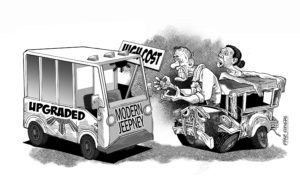The uproar over the remarks made by Asst. Secretary Mark de Leon of the Department of Transportation (DOTr) that driving a passenger jeepney is not a livelihood but a public service won’t help government rationalize its plans to modernize public transport to jeepney operators.
One would have to be either totally naive or ignorant not to know that most jeepney operators depend on the income earned by their drivers to support themselves and their families. And that they divide that income with their drivers along with other expenses like maintenance and fuel.
Based on the traffic congestion and competition from taxis and transport network services, not to mention fuel price hikes and taxes, earnings are not so good which bodes ill for their drivers and their families as well.
Thus one understands their reluctance to heed the government’s call to either upgrade their existing vehicles or acquire new ones which are compliant to strict government regulations on safety and against pollution.
That said, there is some relief through fuel subsidies provided by the government to cushion both the fuel price increases and the taxes. Still, the jeepney operators want to increase fare rates based on their rationale that they need the capital to buy those modern jeepneys being required by the DOTr.
This is where things get dicey and de Leon’s remarks don’t help any in advancing public interest and demand for better mass transport. Capitalization for these modernized jeepneys works better if jeepney operators organize themselves into groups so they can apply for a loan to acquire these units at rates to be agreed on with the government.
There are already mass transport groups and some in Cebu that have already agreed to buy these modern jeepneys in support of the jeepney modernization program. And unless one is financially capable, a lone jeepney operator cannot afford to buy these units even if he or she applies for fare rate increases every year, at the risk of antagonizing the riding public.
Hence the government’s push for an “organized transport business” comprised of jeepney operators rather than single operators to improve their chances to acquire these units not only for their passengers but also for their own. Better built vehicles mean less pollution and more durability since they won’t break down easily.
But that message is lost or totally diluted by the erroneous belief that mass transport for the private sector is not a source of livelihood but a public service.
Mass transport becomes public service when it is operated by government and this service is paid for by its taxpayers who also pay for their salaries and who should expect nothing less than what they pay for.
Disclaimer: The comments uploaded on this site do not necessarily represent or reflect the views of management and owner of Cebudailynews. We reserve the right to exclude comments that we deem to be inconsistent with our editorial standards.

